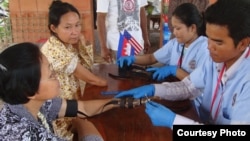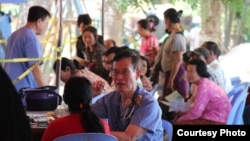A volunteer U.S. medical team is providing free treatment to impoverished Cambodians in Prey Veng province.
The humanitarian mission, led by the Cambodian Health Professionals Association of America (CHPAA), began on Monday and will last until Saturday.
Some 110 volunteers, including 18 doctors, will take part, the CHPAA President, Dr. Song Tan, said.
“We have general treatment for children, elderly people, and surgical service,” he said. “We also hand out artificial arms and provide oral treatment.”
This is the group’s eighth annual mission to their homeland.
CHPAA is a non-profit organization providing free medication and treatment services and regular education to Cambodians. It was founded in 2001 by medical practitioners in Long Beach, CA, according to the association's website.
Dr. Visal Nga, an internal medicine specialist, has participated in the mission since it launched.
Nga said that Cambodian adults often suffer from rheumatism, diabetes, high blood pressure and abdominal pain, as commonly seen in his patients in the US, but the difference is that the quality of health services in the United States is much higher, while Cambodia is still relatively limited.
"These four diseases are common and many patients have suffered from them,” Nga told VOA Khmer last week before heading to Cambodia. “They don’t seek treatment and their conditions are severe. Here, if there is a problem, we go to see the doctor every month, but there is not a lot of medication over there.”
Cambodia lacks skilled doctors and they require additional training overseas to meet the increasing demand of Cambodians, according to Nga.
The team always advise their patients to take preventive measures because treatment is costly and time-consuming, Tan said.
Tan added that Cambodians do not take good care of their eyes, despite the fact that Cambodia is often dusty.
"Everybody does not pay much attention, especially when going out on a sunny day, no one likes wearing sunglasses,” he said. “Some dare not wear sunglasses because they are afraid of being deemed as rude or inappropriate.”
Dental health is also another major problem, said Tan.
"Our people are less likely to take care of their teeth, such as brushing,” he said. “After eating sweet food, they should often wash their mouth and brush their teeth. If it is possible to go to see a dentist regularly, but often it’s hard for them to afford it.”
More than 70 local volunteers are also joining the mission, including medical students.
Another part of the mission is to transfer knowledge to local practitioners.
"Cambodian medical students assist us in translation and they are keen to learn from us by asking lots of questions,” said Nga.
"It is a great pleasure to be with such people who really give everything to make this mission successful,” said Dr. Hadi Emamian, a specialist in gynecology, who accompanied the team.
Since its first mission in 2011, CHPAA has treated more than 35,000 out-patients, including in Phnom Penh, Koh Kong, Takeo, and Svay Rieng provinces.









